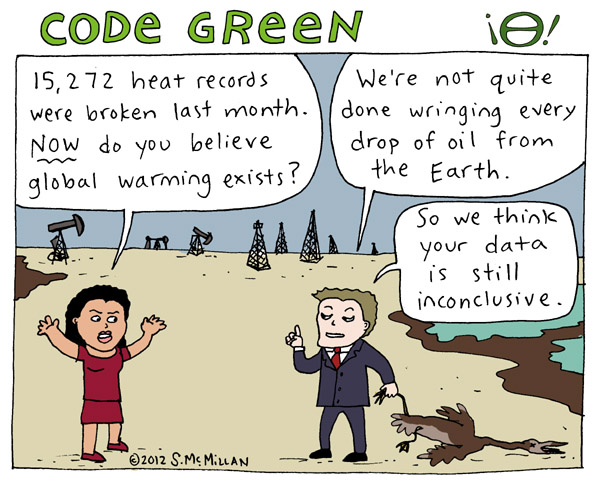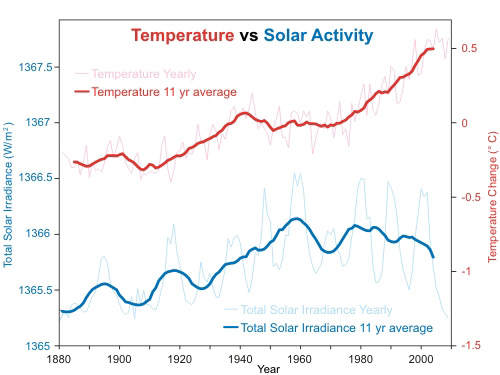
SkS recommends an interview with James Powell by Big Think - James Lawrence Powell: Grandpa, What Did You Do on Earth Day, 2012?
By design, Rob Honeycutt's Why Are We Sure We're Right? #1 generated a considerable amount of intense discussion between SkS readers and authors. In this first part of a two-part post, three SkS authors (Dikran Marsupial, Glenn Tamblyn, and Ari Jokimäki) answered the following questions posed by Honeycutt:

Source: Code Green, a weekly editorial cartoon focused on the environmental emergency, by Stephanie McMillan.
"Yes. I think it is part of our responsibility as scientists to help people understand the research we’ve done. But we have to do that carefully with integrity so that we don’t lose the public’s trust. Parts of this research are enormously complex and in some cases uncertain. We need to do a better job of communicating that uncertainty—and we need to do a better job of communicating our certainty about what is happening because of greenhouse gases.
"We need real leadership on solving this problem—both in terms of adaptation (things like infrastructure to decrease our vulnerability) and mitigation (reducing our emissions by investment in alternative sources of energy). That takes a serious commitment.
"I strongly believe that scientists have a moral responsibility to help people understand what we are facing."
Dr Heidi Cullen's repsonse to the question, Should scientists be involved in the public conversation about climate change? posed to her by Dominique Browning, author of the article, "Earth Day: Discussing the Coming Climate Crisis With Heidi Cullen" posted on the Daily Beast on Apr 22, 202.
Many of us have adopted a memorable quote (or quotes) as our personal words to live by. Mine is the Olgala Sioux proverb:
"Treat the earth well: it was not given to you by your parents, it was loaned to you by your children. We do not inherit the Earth from our Ancestors, we borrow it from our Children."
What are your "words to live by"?
Apophenia is the experience of seeing meaningful patterns or connections in random or meaningless data.
The term was coined in 1958 by Klaus Conrad, who defined it as the "unmotivated seeing of connections" accompanied by a "specific experience of an abnormal meaningfulness", but it has come to represent the human tendency to seek patterns in random nature in general, as with gambling, paranormal phenomena, religion, and even attempts at scientific observation.
Source: Wikipedia
A complete listing of the articles posted on SkS during the past week.
A list of articles that are in the SkS pipeline. Most of these articles, but not necessarily all, will be posted during the week.
It's the sun can be debunked with one simple graphic. As they say, a picture is worth a thousand words.

The first Earth Day on April 22, 1970, activated 20 million Americans from all walks of life and is widely credited with launching the modern environmental movement. The passage of the landmark Clean Air Act, Clean Water Act, Endangered Species Act and many other groundbreaking environmental laws soon followed. Growing out of the first Earth Day, Earth Day Network (EDN) works with over 22,000 partners in 192 countries to broaden, diversify and mobilize the environmental movement. More than 1 billion people now participate in Earth Day activities each year, making it the largest civic observance in the world.
But Earth Day Network does not stop there.
All of EDN’s activities, whether greening schools or promoting green economic policies at home and abroad, inform and energize populations so they will act to secure a healthy future for themselves and their children. With its partner organizations, EDN provides civic engagement opportunities at the local, state, national and global levels. At every turn, EDN works to broaden the definition of "environment" to include all issues that affect our health, our communities and our environment, such as greening deteriorated schools, creating green jobs and investment, and promoting activism to stop air and water pollution.
Over the last 40 years, EDN has executed successful environmental campaigns on issues ranging from climate change and drinking water to voter registration and saving the whale. EDN is a recognized leader in creating civically–oriented innovative programs with partners outside of the environmental movement to tackle new challenges.
Posted by John Hartz on Monday, 23 April, 2012
 |
The Skeptical Science website by Skeptical Science is licensed under a Creative Commons Attribution 3.0 Unported License. |